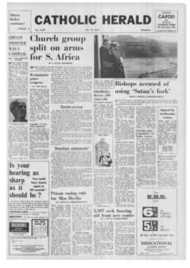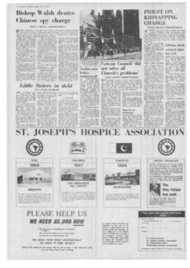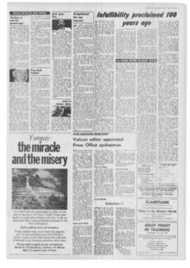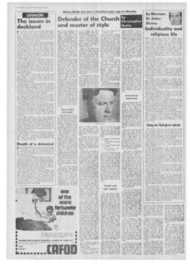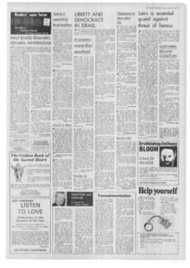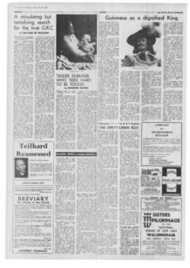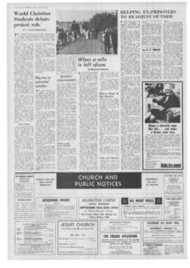Page 4, 24th July 1970
Page 4
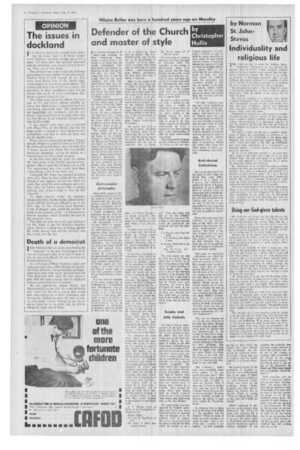
Report an error
Noticed an error on this page?If you've noticed an error in this article please click here to report it.
Tags
Share
Related articles
Opinion
1catholic Profiles: 24}
Gun Or Snare, Do We Really Care?
Test Of Flexibility: New Role For The Jesuits?
A Kind Word For Erasmus
Defender of the Church and master of style
by Christopher Hollis
IT is collusion perhaps at all times—and certainly in these fast-moving, massmedia soaked days — for writers to go down into the trough immediately after their deaths and perhaps indeed even in their old age before they are dead. The young only want to read the young. They are not much concerned with what happened before their day—unless of course it should be resurrected on television—a fate which has never fallen and hardly could have fallen on Hilaire Belloc.
In addition to these general reasons which apply to all the writers of his day. there are particular reasons why Belloc has fallen out of favour. He was a dogmatic and aggressive man, a great champion of causes; many of the causes which be chainpioned are not so much out of favour today as out of date—no longer meaningful.
His picture was of a Europe which was the central home of the Catholic Church, in which "the Faith was Europe and Europe was the Faith"; in which France stood at the centre of Christendom and in which Prussia was its eternal and barbaric enemy. International Jewish financiers threatened t h e security of Christendom and the most powerful and important Jews were German Jews. Among the Germans it was the South Germans who were Christian and civilised. the Prussians their barbaric masters.
Anti-socialist philosophy When Hitler appeared BeiIoc explained that he was but the creature of the Prussian General staff who were proposing to use him. When the Russian Communist revolution broke out he hailed it as a Jewish conspiracy. little foreseeing the day when the Soviet would be the leader of the world's anti-semitism.
He denounced Lloyd George's scheme of compulsory insurance as a plan for the reintroduction of slavery, imported from 13ismarckian Prussia. He proclaimed that such schemes would be rejected with derision by free Frenchmen, not foreseeing that in fact the French would take with especial enthusiasm to a regime of social services. He contrasted the free agricultural economies of France and Ireland with the base capitalist industrialism of Britain, again not foreseeing a day when France and Ireland would make it their main purpose to establish as much industry as they could.
It is true that his exposure of the party system and of Parliamentary Government from Westminster which seemed at the time of his writing to be a wild exaggeration is now pretty generally accepted as almost a platitude, but even there the alternative to it of monarchical or d ictat aria! government which he hailed in Mussolini has turned out to be a remedy far worse than the disease. The Conservative party pays lip service in its programmes to "property owning democracy"—a phrase that might seem to have been borrowed without acknowledgement from BeIloc's distributism but they show little sign of taking it seriously.
Belloc is not much to be blamed that sixty years ago he failed to foresee the developments of the generations. but it does mean that the young of the present age are to a degree to be pardoned if they are not able to turn to him as a prophet. Nor do hip extreme historical theses any longer command assent. The lover of language will pay tribute to the vividness of his reconstruction of historical scenes as in his great French revolutionary biographies.
The scenes were vivid to him, but his theses—the thesis that England owed all its construedve life to the Normans and the Saxon culture was wholly sterile. that Protestantism and the rise of capitalism were as closely allied as Cobbett thought— are hardly acceptable. Nor can one easily say, as one might say of Chesterton. that these theses of his did not matter.
If politics were as futile as he so often said, why did he persist in writing about them? The answer, I suppose, is that there was an intensely combative side to his nature—something compelling him always to be in a fight.
He became a champion of Catholicism long before he was in any way devout in his religion in reaction against the provincialism of English Protestantism. He curiously exaggerated the degree to which the world was compelled to persecute him, as in his strange and lingering grievance throughout I f e against All Souls' College for not having elected him to a fellowship. He had convinced himself that with a fellowship he would have been able to live a quiet and retired life, free from the hurries and hurly-burlies of life, and the need to write for money against the grain. Because of the lack of that security he felt condemned not "ever in my rightful garden (to) linger". One must be very doubtful, however, as to whether he would have lingered in any garden, however much security circumstances offered him. Restlessness was in his blood.
Yet, whatever the truth about these analyses and prophecies which have gone astray, the young of today are very gravely in error if they imagine that it is by them that Belloc can be rightly judged. &Hoc in his closing years was accused by his critics of "militant Catholicism" and hailed by his co-religionists as a leading champion of social and political controversies, yet he never made the mistake of imagining that such controversies were of importance in somparison with beatitude--that religion could of its nature be no more than a social programme, and in them he surely shows himself the superior of many of his modern critics, so busy with their social message to the exclusion of the deeper truths.
E. C. Bentley wrote of Belloc in his Biographies for Beginners thct Hilaire Belloc Is a case for legislation ad hoc.
He seems to think that nobody minds His books being all of different kinds.
The lines were of course a pleasantry but they expressed an important truth. The versatility of his writing is extraordinary. There h a d been nobody like him since Dryden and the public would certainly have been less confused if there had been less variety. If we may summarise his achievements they were basically two—two achievements which, if the modem world does not appreciate them. it is the poorer for its lack of appreciation.
He had a mastery of form and style, a feeling for the right word, a wealth of vocabulary in prose and verse which there is certainly no one today writing in the English tongue to rival. Secondly, whether he was right or wrong in his incidental religious or historical controversies, he had a superiority over most modern men in his understanding of what all these controversies were about.
The fundamental challenge was the challenge of nihilism. "All things go out into mys tcry." Does that mean that they go out into nothing? That things have no sense? Or is there a voice from another world? He understood and respected and met the challenge.
I challenged and I kept the The tbroieeding path alone I trod. It darkens. Stand about my wraith And harbour me— Almighty God.
The critic might say that his faith was in the Church rather than in Christ. In all his writings there is very little about the direct teaching of Christ, hardly such a reference to any of the historical incidents of the Gospels. But it may be that it was from a certain shyness and humility that he shrank from such references, not from a lack of respect for them. It was for the secondary half-faiths of those who thought that they could find an explanation of this world from this world alone that he had no respect.
Sceptic and Jolly Catholic Yet when I was an undergraduate in the years immediately after the First World War it was common to hear my elders who had been young men in the years immediately before the war speak of Belloc as the first living master of English prose and as a master both of delicate and formal serious verse and also a master quite unrivalled of comic verse. Those who so praised him were not Catholics nor of any special Catholic sympathies. The books which they especially praised—the French Revolutionary biographies. particularly that of Denton, were books that were not written about a Catholic nor did they bear any special mark of having been written by a Catholic. They praised his essays which were written from an entirely sceptical point of view. I have in mind such writers, then still young men. as Sir Alan Herbert.
Of course Belloc was later captured by Catholic apologetics and wrote very many historical books to expound what he thought of as the Catholic view of history. He also propounded his theory of the Servile State which he looked on as a Catholic exposition, It is certainly a mistake to seek to build his main reputation on those works. It must indeed even be a matter of argument whether his reputation would not have stood higher had he not written them—or certainly had he not written as many of them. For even from within the Catholic ranks the accusation was sometimes levelled at him that he tended to proclaim as Catholic beliefs, beliefs that were his own crochets and by no means had behind them the revealed authority of the Church.
"All jolly Catholics wear size tens," wrote Guedalla in a fair and high-spirited parody of this side of BelIces nature. And indeed even in his lifetime there was one important point on which he was very seriously at variance with the main body of world Catholic opinion, even though the majority of his Catholic disciples in England were too ignorant 10 know as much. He hailed without qualification Pius X's treatment of modernism, though few would today agree that Pius's tactics of secret vigilance committees were defensible.
Anti-clerical Catholicism But—more important from this point of view—when the World War came Defoe hailed it as a battle for France and Catholicism against the attack of heathen barbarians. It was a difficult thesis to maintain since on France less than a decade before had fallen the most violent anti-clerical legislation of Combes and since even at the time of the war it was impossible for any practising Catholic to obtain in France any post of political importance.
There were more practising Catholics on the German than on the Allied side and opinion at the Curia was certainly predominantly proGerman. The Pope of the time, Benedict XV, was what he himself called an "apostolic pacifist." and saw it as his first Christian duty to bring the war to an end before all European civilisation had committed suicide.
This peace by negotiation —this drawn war—which the Pope advocated, Belloc denounced as an act of treason. Most people today would, I fancy, agree that the Pope showed himself here a great deal the wiser of the two, but our concern at the moment is not with which was right but in making it clear that they differed. Indeed though for tactical reasons he to some extent concealed the fact in his later years, there was never anything specially clerical about Belloc's Catholicism. He was always something of an anti-clerical, holding his faith, as he put it. "however angry we may at times become with the purely human instruments of a divine dispensation."
This was not because he was in any way insincere in his faith, but rather, because however often he might write about them, his interest was not fundamentally in the niceties of theological disputation. The point that really interested him was the fundamental challenge of the sceptic — that challenge that the superficially pietistic may affect to neglect but which ever since Christ's cry from the Cross to the God who had forsaken him must necessarily be a background challenge to any real faith.
"We Catholics," Benin said. "may doubtfully admit some sceptics to be our equals but none others." Was there a Voice from another world or was all belief in value an illusion? That if there was a Voice at all that voice was the voice of the Catholic Church he never for an instant doubted. He never greatly troubled himself to discover the details of what those outside the Church believed.
In a famous letter to Dean Inge he dismissed such beliefs as "the puerilities and the despairs." When he spoke of them, he wrote elsewhere, he spoke of them "with a contempt that I confess is not helpful." As little sympathy had he for those within the Church who were infected with modernism. He dismissed the modernist movement with a saying that was an excellent jest but hardly sufficient as a logical refutation.
The leading hostess of the modernists in England at that day was a distinguished lady of the name of Maud Petre who gave hospitality to the Abbe Bremond, Father Tyrrell and other of the modernist leaders. Belloc imagined that they had rewritten the famous text to describe Christ as saying "Thou art Maud Petre and on this rock will I build my church."
Belloc's approach to religion was more military than theological. The Church spoke with authority but it was the authority with which in an army the officer spoke to the private, and its orders must be obeyed in a spirit of military discipline, If one accepted the authority then one must accept whatever in detail the authority said. As he put it one evening at Campion Hall, somewhat to the dismay of the young Jesuits who were present, "If the Church chose to tell me that in the Sacrament the Bread and Wine were turned into an elephant I should believe it."
With mysticism and the claims to personal inspiration he was quite unsympathetic. The mystics were indeed almost repulsive to him. Increasingly as he grew older he came to see that whether we survive or not life was essentially about death. The question of what happens at death was the one question of real importance. He had no inborn sense of survival. The world around him bore in itself all too few marks that it was the entrance hall to a truer reality beyond itself. He was quite open to the sceptical fear that nothing was true at all.
blog comments powered by Disqus


